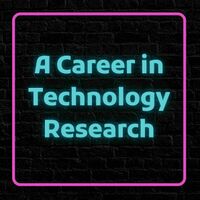A Career in Technology Research: Difference between revisions
No edit summary |
|||
| Line 17: | Line 17: | ||
==Notes & Resources== | ==Notes & Resources== | ||
===== '''Recording & Resources''' ===== | |||
''We will post the recording soon!'' | |||
'''Resources:''' | |||
* A Sex Guide to Digital Security: https://codingrights.org/docs/safernudes/zine_ingles_lado2.pdf | |||
* Research Lab Collective on TCU Mattermost: https://community.internetfreedomfestival.org/community/channels/research-labcollective | |||
===== '''Q&A Section''' ===== | |||
'''How do you think one can “push” for a research theme/project? So far I’ve had opportunities collaborating with non profits that need a researcher for a particular question. However, there are research questions that I think should be explored but I’m not sure how to find a ‘home’ or a space that can support it (with guidance and/or funds)''' | |||
You have to inspire other people with these researches. You should look for partners and convince that your questions are important. It is expensive and unrealistic to plan a long term complete research but we can collaborate and build from the simple version of the idea/question and it will grow because then you will have something that you can apply for grants to. | |||
'''What advice would you give to your 21 year old self, who just graduated college/university? And to your 30 year old one?''' | |||
At 21 everybody is so self-conscious and trying to be good. Take risks and don't focus on be the best of yourself. Be nice, collaborate, be cooperative. | |||
At 30 you have to be practical: organize your life financially and enjoy life, it is important to achive professional success but it is less important than enjoying life. | |||
Latest revision as of 14:01, 25 May 2023

- Who: Natasha Felizi
- Date: Thursday, May 25
- Time: 9am EDT / 1pm UTC (What time is it in my city?)
- Language: English
- Location: Zoom
RSVP: https://digitalrights.formstack.com/forms/welcometodigitalrights
A Career in Technology Research in Digital Rights
Researcher roles are crucial in the digital rights field. They inform strategy, threat landscaping, give us a better understanding of emerging issues, digital culture, and reveal opportunities.
Hear from Natasha Felizi, Journalism and Media Director at Instituto Serrapilheira in Brazil, what it takes to start a career in research in digital rights. Digital culture, campaigning, association with academic institutions, and research for action are some of the topics that we will discuss in this session.
Speaker:
Natasha Felizi is a science and technology researcher and activist. She currently works as the Journalism and Media Director at Instituto Serrapilheira, a private, non-profit institution created in Brazil to support science and promote critical thinking. She has been responsible for building the Journalism and Media portfolio, which aims to create a better-informed public sphere by supporting journalists, creating digital communications strategies and campaigns, and connecting outstanding scientific ideas to an emerging network of journalists, filmmakers, podcast creators, and digital influencers. As a feminist, Natasha worked for civil society organizations as a researcher and advocate for digital rights and its intersection with gender issues and other civic issues. But her original background is in Russian Literature and her first job was to write about contemporary art for a website. So she frequently wonders: Who am I and how the hell did I end up here?
Notes & Resources
Recording & Resources
We will post the recording soon!
Resources:
- A Sex Guide to Digital Security: https://codingrights.org/docs/safernudes/zine_ingles_lado2.pdf
- Research Lab Collective on TCU Mattermost: https://community.internetfreedomfestival.org/community/channels/research-labcollective
- [email protected]
Q&A Section
How do you think one can “push” for a research theme/project? So far I’ve had opportunities collaborating with non profits that need a researcher for a particular question. However, there are research questions that I think should be explored but I’m not sure how to find a ‘home’ or a space that can support it (with guidance and/or funds)
You have to inspire other people with these researches. You should look for partners and convince that your questions are important. It is expensive and unrealistic to plan a long term complete research but we can collaborate and build from the simple version of the idea/question and it will grow because then you will have something that you can apply for grants to.
What advice would you give to your 21 year old self, who just graduated college/university? And to your 30 year old one?
At 21 everybody is so self-conscious and trying to be good. Take risks and don't focus on be the best of yourself. Be nice, collaborate, be cooperative.
At 30 you have to be practical: organize your life financially and enjoy life, it is important to achive professional success but it is less important than enjoying life.